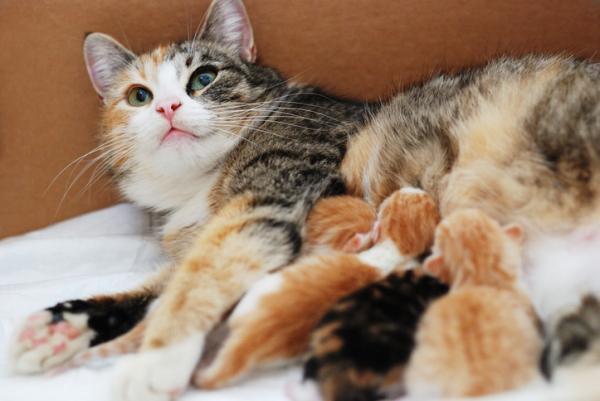Dexamethasone for Cats - Uses, Dosage and Side Effects



See files for Cats
Dexamethasone is a well-known drug that is used in both human and veterinary medicine. Its presence in home medicine cabinets encourages some keepers to administer it to their cats in situations where they would use it themselves. But this is a serious mistake as dexamethasone for cats is different than that for humans and should only be chosen for a cat by a professional veterinarian.
In this AnimalWised article, we will explain what dexamethasone for cats is, its uses, dosage for cats, contraindications and side effects. Keep reading to learn more about this medicine for cats.
What is dexamethasone for cats?
Dexamethasone is a known synthetic glucocorticoid that is derived from cortisol and is capable of long-lasting action. It stands out for its anti-inflammatory power. Among other effects, it causes an increase in glucose in the blood and glycogen in the liver, decreases the vascular reaction that causes inflammation, inhibits the release of histamine or ACTH and reduces the production of antibodies. It is a drug that contributes to the improvement of the clinical signs that the cat shows more than to its cure. That is why the veterinarian will prescribe other drugs and measures designed to combat the cause of the cat's illness.
When administered subcutaneously or intramuscularly it is absorbed very quickly, in a matter of minutes, and distributed throughout the tissues. It is excreted in the urine and in the bile. Dexamethasone in cats can be found in injectable format or in chewable tablets.
It should be clear that you must never self-medicate your cat as the result can be fatal. Only your veterinarian can consciously choose what medication is correct for your cat's condition, as well as its dosage and how long they will need to take it for. Consult your veterinarian for more information about your cat's specific health condition.
If you're wondering how to administer a pill to your cat, read our article about how to give a cat a pill.
Uses of dexamethasone in cats
As previously mentioned, dexamethasone stands out for its anti-inflammatory effect, but also its antiallergic and immunosuppressive effects. Therefore, it is used, above all, in the following cases:
- Inflammatory processes
- Allergies (such as food allergies)
- Trauma
- Shock and circulatory collapse.
It can also be used in joints, which means the cat patient would be practically immobilized for a month and not be able to have surgery for two months.
Dexamethasone dosage in cats
The dosage of dexamethasone for cats can only be determined by the veterinarian, since the cat's disease, their condition, weight, as well as the format of the chosen drug must be taken into account. In other words, it will vary from cat to cat, so this can only be chosen by a professional veterinarian.
As a guideline, if you go for injectable dexamethasone, which can be administered intramuscularly, intravenously, or intra-articularly, the dose would be 0.1-0.3 mg for every kg of body weight.
As you can see, the manufacturer recommends a dosage range that it considers safe and effective. Only the veterinary professional can decide the right one for our cat. They will choose the lowest possible dosage for the shortest time, maintaining its beneficial effect on the cat to help them recover from their health condition. That is why it is common for the vet to have to adjust the dosage for each cat's situation. Lastly, it is recommended to administer dexamethasone in the afternoon.
With that being said, ask your veterinarian for more information on how to administer the dosage prescribed for your cat and follow their instructions precisely.
Contraindications of dexamethasone in cats
Although there are some cases in which it is not advisable to use dexamethasone, the decision of whether or not to administer it will depend exclusively on the veterinarian. In cases like the ones we expose below, its use is not recommended, but if the animal is in an emergency situation, it is very possible that the professional will consider its administration. They are as follows:
- Immunosuppression.
- Diabetes mellitus
- Chronic nephritis, which is an inflammation of the kidney.
- Renal insufficiency.
- Heart failure.
- Osteoporosis.
- Diseases caused by viruses when they are active in the blood.
- Systemic infections caused by fungi.
- Pathologies of bacterial origin if the cat is not receiving the corresponding antibiotic treatment.
- Ulcers both at the gastrointestinal level and on the cornea.
- Glaucoma, a serious eye disease.
- Demodicosis, which is a parasitic disease caused by the Demodex mite.
- Burns.
- Fractures, infections of the joints caused by bacteria or necrosis in the bone advise against its intra-articular administration.
- Cats in pregnancy, as it could cause malformations in the fetuses, abortions, premature or difficult deliveries, death of the kittens, retention of the placentas or metritis, which is the inflammation of the uterus. It can also affect milk production during breastfeeding.
- Very old cats, malnourished or with hypertension. On the other hand, it has an effect on growth, hence the caution with the youngest specimens.
- Of course, if we suspect or know that the cat is allergic to dexamethasone.
Also, it is important to be aware of the interaction that may occur between dexamethasone and other medications. That is why we must always inform the veterinarian of any drug or vitamins that we are giving the cat, if it is unknown to them. For example, due to the immunosuppressive effect of dexamethasone, it cannot be combined with vaccines or given for two weeks after vaccination. It also interacts with insulin.

Side effects of dexamethasone in cats
Consumption of dexamethasone can cause Cushing syndrome, also known as iatrogenic hyperadrenocorticism. It is a disease that triggers symptoms such as weight gain, weakness, loss of muscle mass or osteoporosis.
To try to avoid this, at the end of the treatment it is recommended to withdraw dexamethasone gradually. It is also important to avoid its prolonged use to minimize the risks. On the other hand, it is relatively easy and quick to see signs such as the following when the drug is administered systemically:
- Polyuria, which is an increase in the amount of urine passed.
- Polydipsia or increased water intake.
- Polyphagia, which involves a high consumption of food.
- Hypokalemia, which is a decrease in potassium levels in the blood, especially in cats that are being treated with diuretics that favor the excretion of potassium.
- Calcinosis cutaneous, a skin disease caused by an abnormal deposit of calcium in the subcutaneous tissue.
- Gastrointestinal ulcers, especially if used at the same time as an NSAID.
- Possible delay in wound healing.
- In some cases, fluid retention.
- Enlargement of the liver, which is known as hepatomegaly. Liver enzymes will also be increased.
- Pancreatitis
- Hyperglycemia, which is a blood glucose value above what is considered normal.
This article is purely informative. AnimalWised does not have the authority to prescribe any veterinary treatment or create a diagnosis. We invite you to take your pet to the veterinarian if they are suffering from any condition or pain.
If you want to read similar articles to Dexamethasone for Cats - Uses, Dosage and Side Effects, we recommend you visit our Medicine category.






